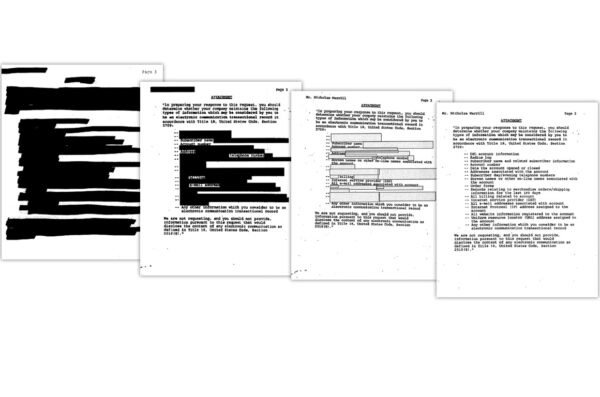New Documents Unsealed in ACLU and NYCLU Patriot Act Challenge
Documents Confirm Existence of ""John Doe"" Client, Who Says He Fears Abuse of Government Powers
FOR IMMEDIATE RELEASE
NEW YORK - The American Civil Liberties Union today made public its brief and supporting documents asking a court to strike down a controversial provision of the Patriot Act. Among the documents is a heavily censored declaration that confirms, for the first time, the existence of the ACLU's anonymous client in the case.
The "National Security Letter" provision at issue allows the government to demand sensitive customer records from businesses without judicial oversight. The ACLU and its New York affiliate are also challenging a provision of the law that imposes a broad gag order on any entity that receives a National Security Letter, or NSL.
"The gag provision silences those who are most likely to oppose the Patriot Act," ACLU Executive Director Anthony D. Romero said in his affidavit to the court. "It is particularly troubling" he said, that while the ACLU has been gagged from discussing the Patriot Act power, "President Bush and representatives of the FBI and Justice Department are engaged in a public campaign in support of the Patriot Act."
The ACLU is engaged in an ongoing dispute with the government over the extent of the sealing order in the case. Among the documents the ACLU posted for the first time today are the declaration of its "John Doe" client - an Internet Service Provider (ISP).
"The government has now prohibited the disclosure of my name and my company's name in connection with the case," Doe said in his declaration to the court. "They have provided no further clarification about what I can and cannot say."
"I believe that the government may be abusing its power by targeting people with unpopular views," Doe said. "I am challenging the constitutionality of the NSL provision in an effort to protect all of my clients' interests. "I have no doubt that [blacked-out] ISPs, such as America Online, must have received at least one of these NSLs. Because of the gag order, however, I am not able to contact them [blacked-out]." (Note: Words or statements blacked-out by court order are indicated in brackets.)
Among other documents the ACLU posted today are a declaration from Internet expert Simson Garfinkel, a friend-of-the-court brief filed by the Electronic Frontier Foundation, Salon.com, the U.S. Internet Industry Association and others, and another friend-of-the-court brief filed by the American Library Association, the American Booksellers Foundation for Free Expression and the Freedom to Read Foundation.
The briefs detail the groups' concerns that the law will have a chilling effect on communications online. As Garfinkel and the advocacy groups pointed out in their filings, the National Security Letter provision covers not only ISPs but any group that allows users to send messages from its website, such as the ACLU or Moveon.org.
Judge Victor Marrero has issued an order establishing a procedure for making redacted versions of sealed documents available to the public as soon as possible. Under that procedure, the ACLU and NYCLU are challenging further redactions of the documents posted today and will update their websites regularly as new or revised documents become available.
According to the court's briefing schedule, the government will respond to the ACLU's brief on June 7, 2004; all briefing will be completed in July 2004. The court has not indicated whether any hearings will be open to the media and the public.
Attorneys in the case are Ann Beeson, Jameel Jaffer and Sharon McGowan of the ACLU, and Arthur Eisenberg of the NYCLU.
For more information on the Patriot Act and National Security Letters, including access to all documents unsealed by the court, go to /nsl


